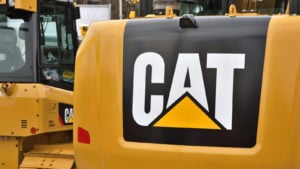Now that funding for infrastructure spending is in place, the sector is bound for gains. The Infrastructure Investment and Jobs Act (IIJA) has allocated more than $1 trillion to infrastructure projects across the U.S. This complements the extra spending available through the Inflation Reduction Act and the CHIPS Act.
So far, construction spending has been on a tear. According to the U.S. Census Bureau, construction spending in the first five months of 2024 was $836.3 billion, up 8.8% year-over-year. Under this government-supported spending, these construction stocks that provide materials and equipment will enjoy growing demand.
CRH (CRH)

CRH (NYSE:CRH) is a vertically integrated construction stock reaping gains from the IIJA. Through a series of acquisitions, the company has become one of the major suppliers of aggregates, cement and other construction products. Furthermore, with attractive growth markets, this company will continue to deliver value to shareholders.
Today, CRH is well-positioned to capitalize on strong growth opportunities in its end markets. The business is diversified and management expects to generate 75% of 2024 EBITDA from the U.S. and the rest from Europe. Moreover, it will profit from government infrastructure spending and on-shoring trends.
Due to its exposure to favorable markets that will be a source of robust underlying demand going forward, CRH is one of the best construction stocks to buy today. In February, it completed the $2.1 billion acquisition of a portfolio of cement and ready-mix concrete assets and operations in Texas. This deal positions the company as the top building materials business in the fast-growing state.
Looking at the numbers, CRH stock is undervalued. The company delivered 2% revenue growth and 15% adjusted EBITDA growth in Q1 2024. Additionally, the earnings report reaffirmed adjusted EBITDA of $6.55 to $6.85 billion and EPS between $5.15 to $5.45 for the full year. This means it’s trading at 16 times forward earnings, which is a bargain considering the IIJA tailwinds.
United Rentals (URI)

With booming construction, rental equipment is one of the strongest areas of demand. Notably, most companies and governments prefer renting over buying because renting preserves capital and eliminates the need for skilled labor to maintain the equipment. This preference bodes well for United Rentals (NYSE:URI), which has the largest U.S. rental market share.
Considering the secular on-shoring trends happening in North America, United Rentals is in a growth sweet spot. As the market leader, it has the scale, size and breadth of solutions to offer a one-stop shop for all customer equipment needs. Its equipment fleet includes forklifts, trucks, power equipment, compressors, lighting and mobile storage. Moreover, it provides various specialty products to meet the complex requirements of customers.
Due to its dominant position, United Rentals continues to post impressive results. In Q2 2024, it achieved record revenues of $3.7 billion, representing 6.2% YOY growth. Equipment rental revenue grew 7.8% to $3.2 billion. And due to higher gross margins from rental revenue, net income rose 7.6% to a second-quarter record of $636 million.
According to management, the company is on track for another year of strong results, forecasting $7.09 to $7.24 billion in adjusted EBITDA. Even better, its ambitious targets of $20 billion in revenue and $10 billion in adjusted EBITDA by 2028 make it one of the must-own construction stocks.
Caterpillar (CAT)

Heavy machinery maker Caterpillar (NYSE:CAT) is the quintessential construction stock. After all, it manufactures equipment such as backhoe loaders, asphalt pavers, motor graders and compactors that are crucial in construction. These machines serve residential construction projects and government-related infrastructure spending such as roads.
After 13% growth in 2023, Caterpillar has been off to a slow start this year, with revenues flat in Q1. Still, management maintained that Caterpillar has solid prospects in non-residential and residential construction. Although China and Europe are experiencing weakness, strength in other regions will offset this weakness.
Management expects growth in North American non-residential demand due to government-related infrastructure spending. Additionally, they see solid growth in the Middle East due to strong construction activity. Another positive is that its power generation business is booming due to demand for large reciprocating engines from data center players.
Although growth will slow in 2024, Caterpillar is one of the best construction stocks to buy due to its strong record of shareholder returns. It has a stellar dividend payment history, posting 30 years of dividend growth. This record continues, with the company spending $4.5 billion on share repurchases and $600 million on dividends in Q1 2024. As of this writing, CAT stock trades at 15 times forward EPS and has a 1.6% dividend, making it a buy.
On the date of publication, Charles Munyi did not hold (either directly or indirectly) any positions in the securities mentioned in this article. The opinions expressed in this article are those of the writer, subject to the InvestorPlace.com Publishing Guidelines.
On the date of publication, the responsible editor did not have (either directly or
indirectly) any positions in the securities mentioned in this article.
Charles Munyi has extensive writing experience in various industries, including personal finance, insurance, technology, wealth management and stock investing. He has written for a wide variety of financial websites including Benzinga, The Balance and Investopedia.
